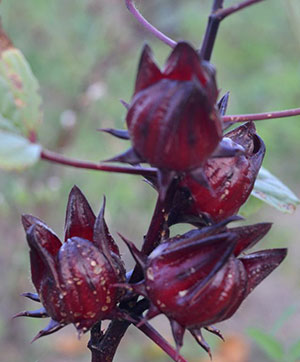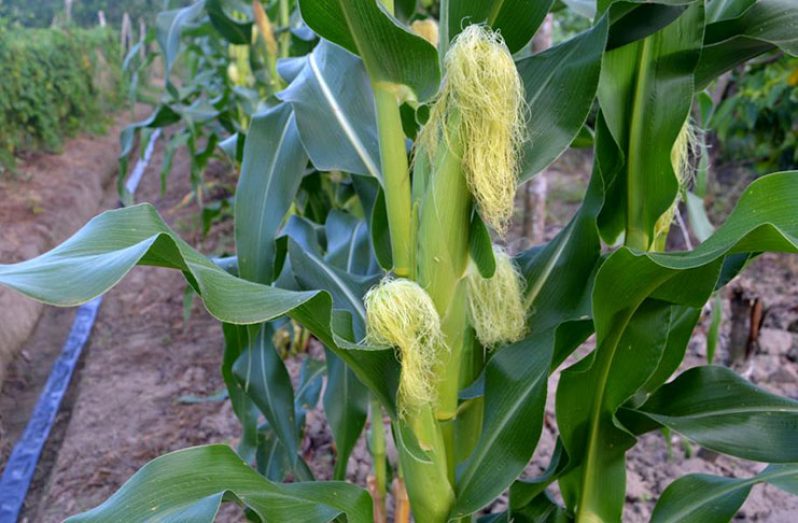Story and photos by Alva Solomon
IT is Saturday afternoon and Sarojinie Persaud and her husband are trying to fix their irrigation system to allow water onto their farm at Laluni off the Soesdyke-Linden Highway.
Persaud, fondly called “Radha”, is not only concerned about the changing weather patterns, but a transition she and her family are making from investing time, money and energy in permanent crops, which the matriarch of the family noted, is in demand these days against cash crops.

Persaud has been a farmer for decades, since her teenage years she said and these days, the farmland is being prepared to brace for an expected dry-weather patch.
Several days ago, the Ministry of Agriculture’s Hydromet Office issued a call for residents to conserve water as Guyana begins the transition into the secondary dry season.
It is necessary for residents, especially farmers, to conserve water during this period, the authorities implored.
Ironically, overcast conditions developed over Laluni within minutes of the visit to the Persauds, even as her husband walked the length of the acres of land, checking the pipes as he investigated why the water was not finding its way to the plants.
“I fixed the pump only yesterday, so must be another problem,” he said, as he called out to Radha to check on a patch of corn the family had planted a few weeks back.
The mother of four children noted during a tour of a section of the family’s farm, that she has sectioned–off her lands to her children and each has his/her own plots which are also actively under cultivation.
On her patch, Persaud has planted a range of permanent crops, including red beans, two varieties of seime, sorrel, sweet corn, oranges, and cherries, among others.
She said the corn would be ready for harvesting in another three –four weeks and there is already a market for the product.
In addition, Persaud pointed to a group of “tiger teeth” pepper plants, which she noted will be picked soon, and according to her, while markets for the permanent crops are there, the cash-crops seem to be taking a beating.
As such, she said the family has planted less bora, calaloo, celery and cabbage, to name a few. She said all farmers in the area are making the transition and this was evident as this newspaper travelled through each of the four sections of Laluni.
Persaud noted however, that while she is moving on from the cash crops, at the moment she is experimenting with several non-traditional crops. These include parsley and purple cabbage and the plants were cultivated under a shade-house, which the family erected with help from the National Agricultural Research and Extension Institute (NAREI).
She said her daughter is also grooming a patch of cauliflower plants on a plot aback hers, and according to the woman, the plants are responding well to the soil.
RESPONDING WELL
She said the plants at the shade-house have been responding well to the land, noting that no fertiliser has been utilised in the growth process thus far.
Two tobacco plants, which are synonymous with the commencement of agriculture at Laluni, were planted nearby as the Persauds remind themselves of how they started farming in the area.
Farther up the road, Edward Henry was awaiting the growth of his peppers at a small nursery he has erected, as he too prepares for the dry weather.
Back in February of 2016, when the country was hit by the El Nino dry-weather phenomenon, this newspaper visited Henry’s farm and at the time the farmer, like others, was experiencing difficulties accessing water.
Over the weekend, he appeared in brighter spirits as he explained that the rains have been intermittent in recent weeks, and according to him, it is a sign that there will be a change in the weather patterns.
“I am hoping it isn’t anything serious,” he said of the expected dry weather.
Henry, who is the son of Vincent Henry, the founder of Laluni, noted that his son has a plot of land adjacent to his and he too is preparing to invest in permanent crops.
During checks with other farmers, it was observed that most have invested in water systems at the farmlands, a network which is connected to nearby creeks; and while the weather may change, the residents appeared to have their plans in working order as regards water sources.
Farming at Laluni became popular when the Demerara Tobacco Company (Demtoco) ceased cultivating tobacco there in the early 1990s.
The population has since increased and the villagers find a readily available market in the capital city, at the Stabroek Market on Friday nights through the weekend. Some are also lucky to market their entire truck or busload to vendors at the city’s largest market.
While access to markets is not an issue, better prices for goods have always been a concern for farmers in the area; but planting and reaping will not cease anytime soon at the self-sufficient community of Laluni.












